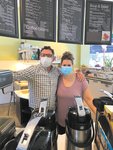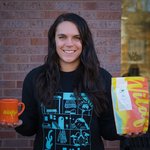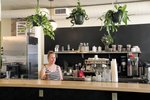


Longtime Nokomis Beach
supported by regulars
Nokomis Beach Coffee (4956 S. 28th Ave.) closed its doors for the first time in 22 years on March 13, 2020 – “8270 days in a row, not a bad run,” observed Dennis Kloek, who owns the coffee shop with his wife, Mary.
They remained closed until May 4. “Upon reopening I was surprised how generous our customers were, both in terms of purchasing of gift cards you knew were probably never going to be used as well as going out of their way just to consume, to show support,” Kloek said.
“We reopened with very strict COVID-19 precautions, some would say the most strict of anywhere they’ve been. I was ok with that. I saw early on the value many of our customers saw in our protocols. I’ve probably said some things to customers in the last year I would’ve never imagined myself saying to a customer, but when it came to our COVID-19 plan I wasn’t going to waiver or compromise.”
They surrounded the barista kitchen with plexiglass, and established a one-way ordering process with a strict 9-foot distancing. Everything was contactless. Food and drink orders were filled and placed on a table outside the back door. They paid with a new contactless system. “The idea was to get them in and get them out as quick as possible,” said Kloek. “This procedure is still in place today.”
The Kloeks worked during the week and their employees covered weekend hours, which created two pods in case one came in contact with COVID-19.
They provided patio seating and asked that no more than four people sit together. When folks pushed tabled together to accommodate eight or more, Kloek bolted the tabled down with 10-foot spacing. “In the end, I believe our protocols paid dividends. People eventually came to respect our position and desire to keep every safe,” observed Kloek. “By September we came within 4 % of the same months sales the year before.”
A year later, Kloek can’t say for certain that they’ve survived the pandemic.
But they are still moving forward.
“Although the business may look different than it did a year ago, it’s working,” Kloek said. “We have reached close to pre-pandemic numbers while being open far fewer hours. We now close at 2 p.m. Monday to Friday and 5 p.m. Saturday to Sunday, as opposed to 8:30 p.m. all days pre-COVID-19.” While Kloek is considering expanding hours again, he has seen a sharp decline in applications.
Receiving both rounds of PPP was crucial for Nokomis Beach Coffee. The funds allowed the Kloeks to bring back every employee that was working for them when they closed in March 2020, and keep them at the same amount of hours.
“Between new minimum wage laws, mandatory sick leave, and increasing rent because of property tax increases, we knew we had to find a way to trim expenses somewhere. For us it was cutting any hours that truly were not going to be profitable,” said Kloek.
“For years I took pride in the fact I was able to provide 13/15 jobs for individuals but now that’s down to 7/8. Not many people realize that in this industry a $15 an hour wage cost the employer closer to $19 after all taxes are paid.
“When you add in the sick leave/ taxes on wages and tips, workman’s comp, and unemployment insurance, we just can’t justify any extra hours that can’t carry themselves.”
The Kloeks have seen a lot of changes in the Nokomis community during their 23 years as business owners. More businesses have moved into the area, and their clientele has gotten younger.
They opened Nokomis Beach Coffee on Sept. 1, 1998, and are known for their expansive patio that welcomes dogs.
“While in college I had lived in Vienna for just over a year and really enjoyed going to all the coffee shops that had been part of their culture for many years. Upon returning I knew a shop would be somewhere in my future,” recalled Kloek.
“It was early on in our business life that we knew we want to live in the same community as we worked so we bought a house on the south end of the lake from where the shop is.”
Living and working in Nokomis East has been rewarding for them.
“The community has been amazingly supportive of the shop over the years,” pointed out Kloek. “Even as franchises have moved in our customers have remained incredibly loyal providing us with steady growth throughout the first 22 years.”
He added, “COVID-19 has, I believe changed every business model out there. Ours needed changing anyways.
“In the end, like so many, I’m glad to have this year behind us. It’s definitely had its challenges, but I’m pleased with how we’ve come out of it on the other side. In some ways our business is better because of it. It has forced us to get creative and find a way to make things work for the long term.”
Learn more at http://lighthouseinternet.com/nokomis/mobile/index.html.
Wildflyer opened
during a pandemic
Wildflyer Coffee opened its doors in the middle of a global pandemic.
Peace Coffee opted not to reopen its longtime coffee shop at 3262 Minnehaha Ave. and to focus instead on coffee sales. They reached out to Wildflyer who decided the time was right to expand from a coffee cart to a cafe.
“We didn’t view it as opening a coffee shop, we viewed it as opening an employment training program for youth experiencing homelessness, and that was needed more than ever before during the pandemic when unemployment was high and entry-level jobs were vanishing overnight,” explained Wildflyer CEO Carley Kammerer. “The need was too great to ignore it, and the opportunity to take over this wonderful shop and learn from Peace Coffee was too good to pass up. We were smart about it, but we knew this was ‘it’ for Wildflyer, so we went for it.
“Would I open a coffee shop during a pandemic? No. Would I open an employment training program for youth? Yes.”
Former Southside resident Kammerer is a licensed social worker who has worked with youth experiencing homelessness for over eight years. “In that time, I started noticing a common trend where my clients could get a job but would quickly lose it, putting them in a cycle of homelessness and instability with no pathway out,” she observed. “There are so many barriers to employment while experiencing homelessness, things like transportation, hygiene/professional clothing, not even having vital documents to begin with, as well as a lack of soft skills.
“It seemed like something needed to exist that just helped cultivate these skills and eliminate these barriers so youth could achieve self-sufficiency. Out of that resource gap came the vision for Wildflyer Coffee.”
They started with a mobile cart at farmer’s markets and private events in 2017, and received more youth applications than the cart could employ. They began raising money in 2019 to expand into a coffee shop. They were all set to sign a lease in March 2020. Then COVID-19 hit.
They put their plans on hold.
“Peace had created a really special, local neighborhood coffee shop, and we knew we would benefit from that. We have already benefited from Peace’s customers wanting to see us succeed,” remarked Kammerer. “The shop itself was already a coffee shop, which meant we could spend much less on a build-out and divert funds to our youth program, which was a wise decision based on our mission. We also love this area of South, and knew that the residents of Longfellow would be very on board with our mission.”
After neutralizing the color scheme, putting up their logo and color patterns on the back wall, and bringing in new furniture, Wildflyer Coffee opened on Dec. 15, 2020.
Located just three blocks from the Third Precinct, Wildflyer staff and board are talking a lot about racial justice.
“Many of the youth we employ are BIPOC, and statistically, youth of color experience homelessness at higher rates than their peers,” Kammerer pointed out. “Internally, we’re working to make sure our staff/leadership/board of directors adequately reflects the youth we employ, and part of that is diversity and bringing program graduates themselves onto the board.
“Externally, with COVID restrictions easing up, we are hoping to use our shop, especially the extra side room, as a hub for community meetings and activism. We’re not sure what that looks like yet, but working on opening it up as a place to be used for real social change.”
The nonprofit coffee shop, creates employment opportunities for youth aged 16-24 who are experiencing homelessness and housing instability. “Every dollar spent not only goes back into our work and life skills training program, but each customer is actually partnering with the mission closely by providing those critical interactions that are the training platform for skill development,” said Kammerer. “It’s really a community response to ending youth homelessness in our city.”
The name came from the idea that the youth who work there are “wildflyers.”
“We feel like our youth have so much potential within them, they just need support to really soar,” said Kammerer. “We provide that support, and partner with them in moving forward into a whole new future.”
She recommends folks check out their toast menu, with the popular avocado or hummus and kimchi toast. “Right now, with our spring drink menu, our ‘paint me like one of your French girls’ latte is really popular. It’s Rose Cardamom!
“Come see our space, meet our youth, be part of the mission and vision!”
More at https://wildflyercoffee.com/.
Milkweed adjusts hours and staff
Milkweed (3822 E. Lake St.) had been open less than a year under owners Brenda Ingersoll and Alex Needham when the pandemic hit. They shut down in March with 10 staff members, and when they reopened in April it was with the two of them and one other person.
Needham built a take-out window in the front door and installed plexiglass around the barista kitchen, and they started selling their signature drinks again with limited hours. He built a few more take-out doors for other local businesses, as well.
A year later, they began ramping up their staff again, starting from scratch as former employees had drifted away. Their menu is complicated and takes 4-5 days of training to master. “Generally, if they’re excited about what we do, they can get along with the workload,” remarked Ingersoll.
The menu includes delicious and nutritious drinks that are tailored to specific ailments, such as a hot toddy with elderberry, lime, rosemary and trace minerals to build the immune system in the winter. The Dirty Sailor is a warming, detoxifying dirty chai made with dandelion, burdock, chicory, ghee and seasonal ayurvedic spices. Their signature drink is a nettle and matcha latte with lavender syrup, oat pistachio milk and cbd, served cold or hot. With a focus on vegan and dairy-free offerings, they make their own plant-based milks (coconut, almond, oat pistachio, pumpkin seed and hazelnut).
“I see coffee as medicine. I see tea as medicine,” said Ingersoll, who views the cafe as a mothering space. “We’re just trying to heal and caffeinate.”
Many of the herbs and some tea blends come from Sacred Blossom Farm in Mondovi, Wisconsin or Frontier Coop in Iowa.
Regular patrons include folks from the local neighborhood as well as people from the greater Twin Cities’ metro area drawn by Milkweed’s unique plant-based, vegan drinks and gluten-free options. One woman drives 30 minutes daily each way from St. Louis Park.
“We’ve become a secret destination,” said Ingersoll. “Tons of people don’t do dairy, it turns out.”
The health and safety directives along with peoples’ new habits changed how their space is used. Previously, there was a morning rush of folks getting coffee on their way to work in the morning. Now, they serve a steady stream of people all day. Some get their coffee and tea to go, while others pick one of 12 chairs at six tables on the sidewalk patio.
Being located on East Lake Street through the civil unrest has been stressful, admitted Ingersoll. She drives past the Third Precinct and destroyed buildings every day on her way to work. “It’s hard to see an area that was finally coming back to life get destroyed,” said Ingersoll. “I’m sure it will start to grow and flourish again. It’s just going to take time.”
For a time last summer following the protests, Milkweed and Peppers and Fries next door were the only places open on that stretch of East Lake Street.
“People really needed coffee. They were up all night patrolling the neighborhood,” recalled Ingersoll.
It has been rewarding to offer people a space to talk and feel safe.
Comments
No comments on this item Please log in to comment by clicking here